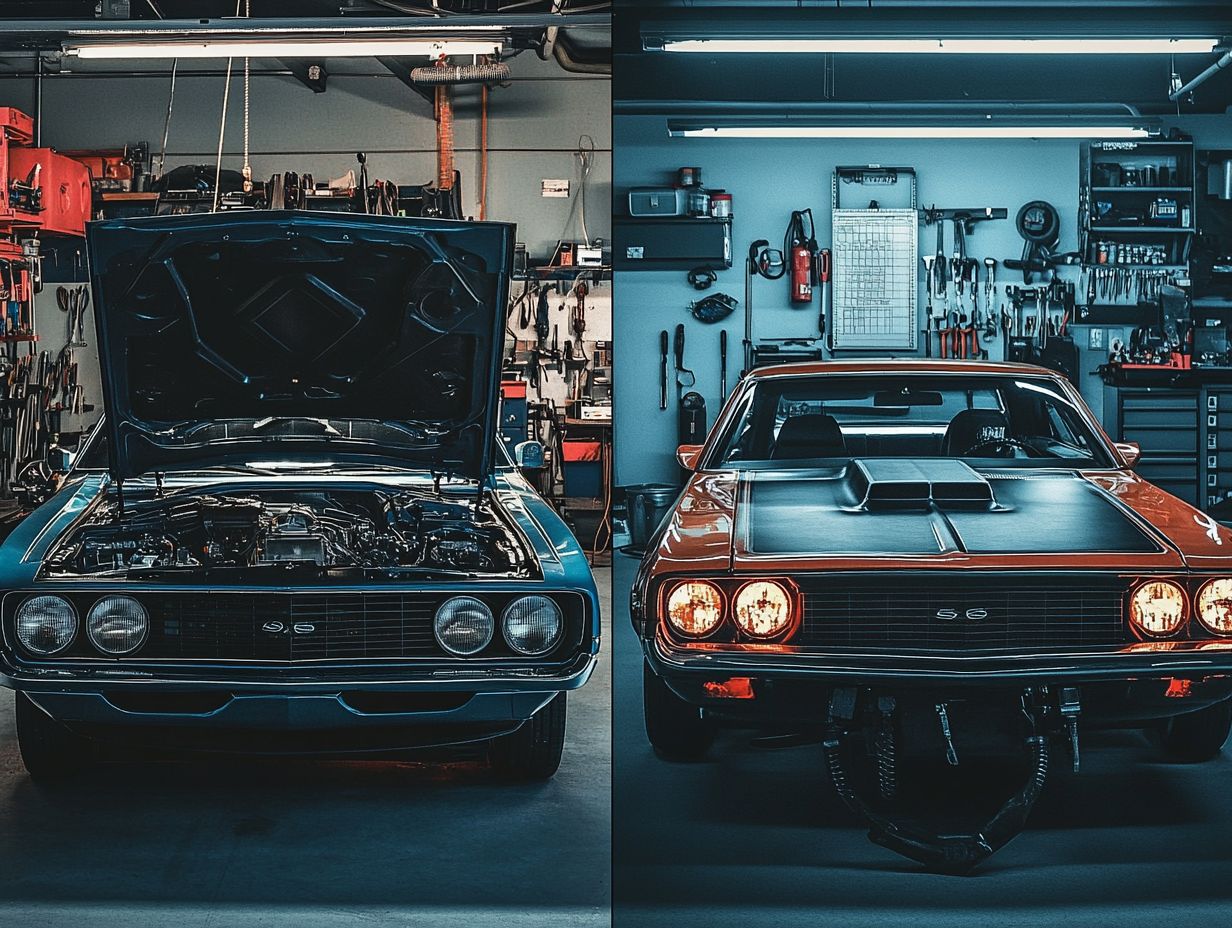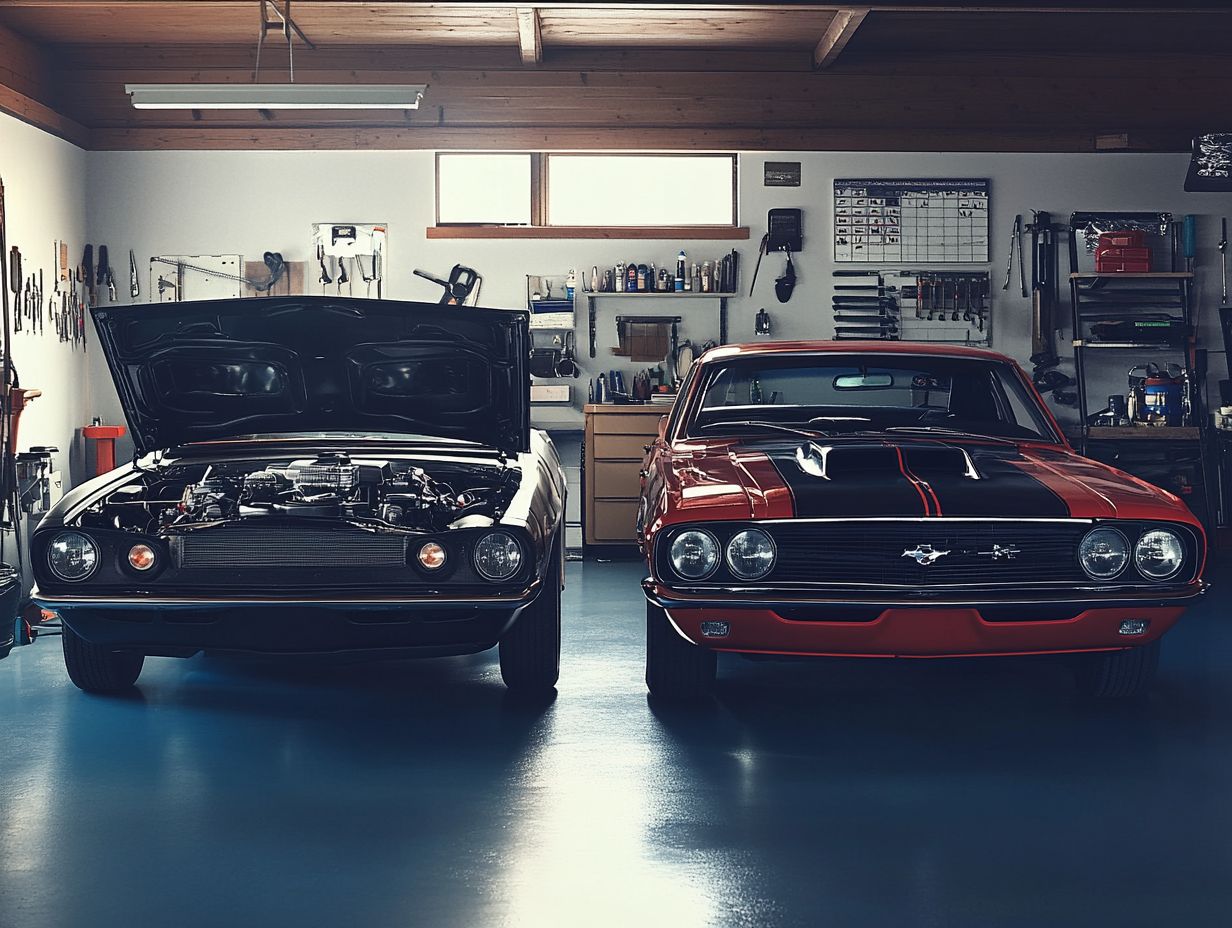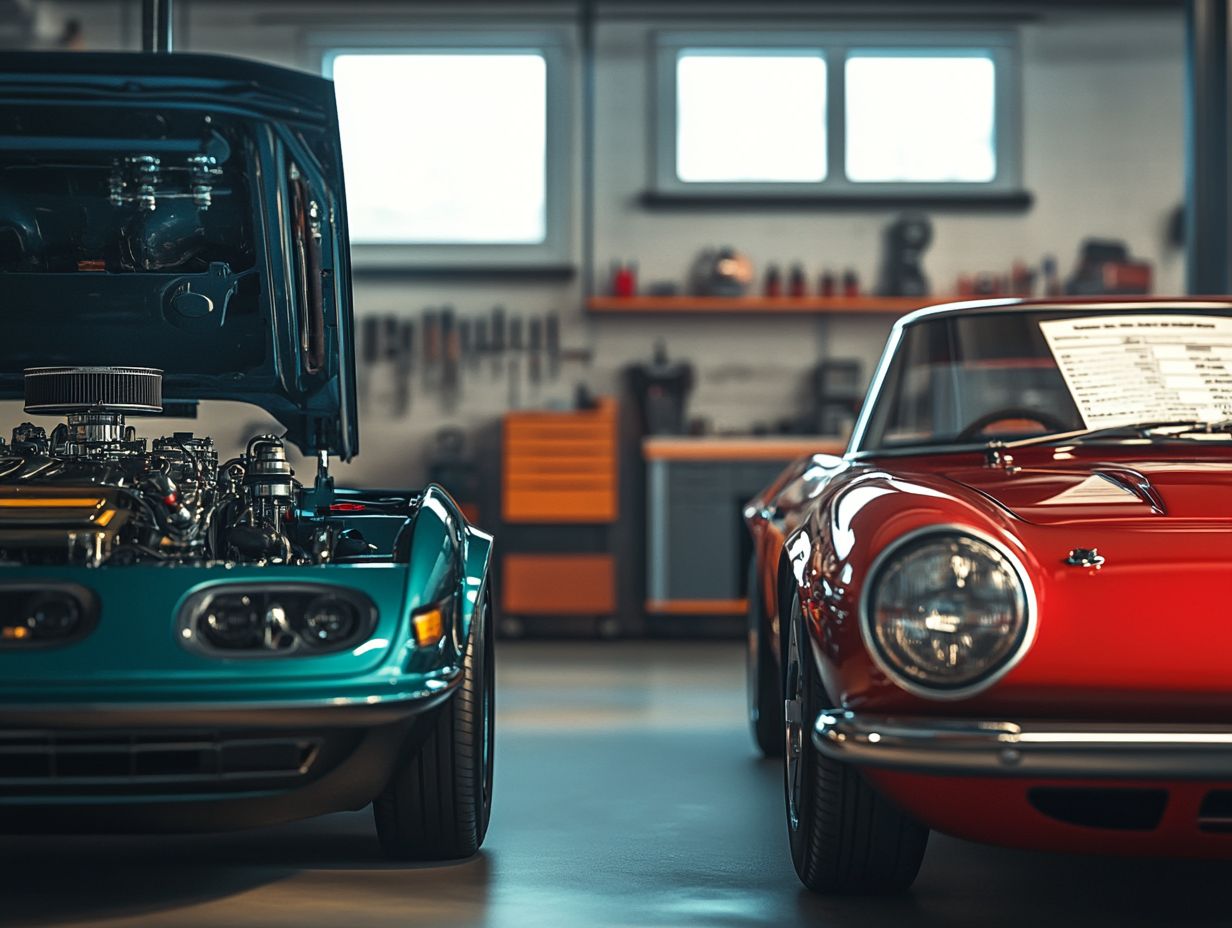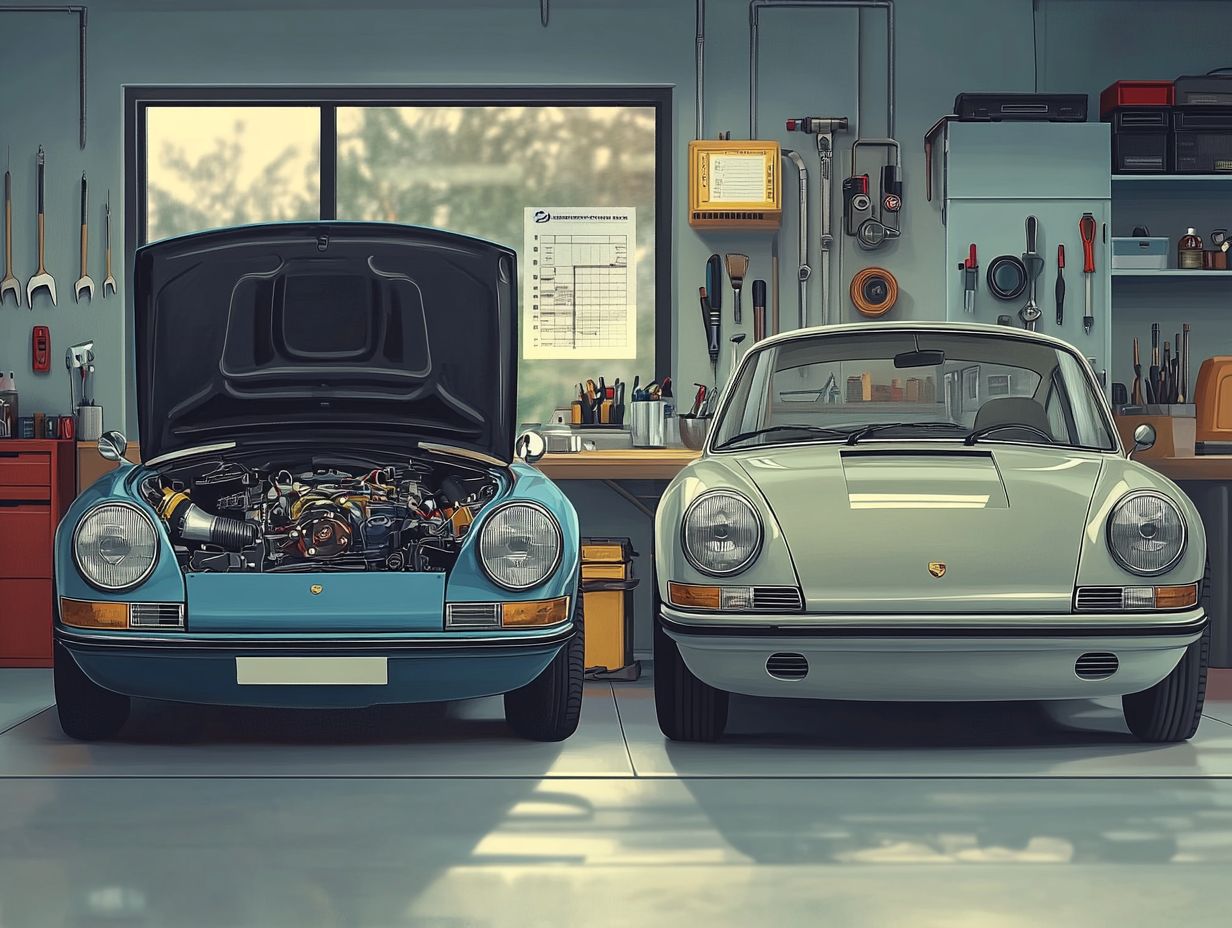Comparison of Maintenance Features in Cars
Regular maintenance keeps your car running like new! This guide delves into both fundamental and advanced maintenance features that every car owner should consider, ranging from oil changes and tire rotations to engine diagnostics and brake system inspections. It also compares maintenance offerings across popular brands, analyzes the associated costs, and provides tips on selecting a car that aligns with your long-term maintenance needs.
Whether you re a first-time buyer or a seasoned car enthusiast, grasping these elements empowers you to make informed decisions for a reliable and enjoyable driving experience.
Contents
- Key Takeaways:
- Importance of Regular Maintenance
- Basic Maintenance Features
- Advanced Maintenance Features
- Comparing Maintenance Features Across Brands
- Cost Comparison of Maintenance Features
- How to Choose a Car with Strong Maintenance Features
- Frequently Asked Questions
- Curious about common maintenance features in cars?
- What is the difference between scheduled and preventative maintenance?
- Do all cars have the same maintenance features?
- Is it necessary to follow the recommended maintenance schedule for my car?
- Can I perform maintenance tasks on my car myself?
- What should I consider when comparing maintenance features in different cars?
Key Takeaways:

- Keep your car running longer and better with regular maintenance!
- Basic maintenance features include oil changes, fluid checks, and tire maintenance.
- When comparing maintenance features across brands, consider their reputation and offerings for advanced features like tools that check your engine s performance and brake system inspections.
Importance of Regular Maintenance
Regular maintenance is essential for prolonging the life of your vehicle and ensuring it performs at its best, especially when you’re investing in top-tier cars meant for long-term ownership.
By prioritizing proper maintenance, you not only boost your vehicle’s reliability but also significantly reduce financial burdens by minimizing the chances of expensive repairs down the line. Follow a maintenance schedule to keep your vehicle dependable and ready for the road!
This attention to detail is crucial, especially for long-term ownership and the importance of maintenance that ensures your vehicle is reliable. Sticking to a recommended maintenance schedule enhances your vehicle s resale value and elevates your overall driving experience.
Basic Maintenance Features
Basic maintenance features, like oil changes and fluid checks, are crucial for ensuring that your vehicle operates smoothly and efficiently throughout its lifespan. This attention to detail becomes even more significant when considering long-term ownership.
Oil Changes and Fluid Checks
Regular oil changes are essential for your vehicle s health, significantly influencing both maintenance costs and overall performance. Tailoring these services to your driving habits and conditions can make all the difference.
Fluid checks are just as vital. Keeping a close eye on transmission fluid, brake fluid, and coolant levels helps maintain optimal operation and can prevent major breakdowns.
By prioritizing these routine maintenance tasks, you can significantly enhance your vehicle’s reliability while minimizing unexpected repair costs in the future. Remember, each fluid plays a specific role lubricating moving parts, transferring power, or regulating temperature ensuring your vehicle performs at its peak. This means a safer, more enjoyable ride for you!
Tire Maintenance and Rotation
Tire maintenance and rotation are essential elements of a proactive upkeep plan, ensuring even wear and enhancing the reliability of all vehicle types, including SUVs and trucks.
Regularly checking your tire pressure is crucial; under-inflated tires can lead to diminished fuel efficiency and create hazardous driving conditions. Monitor tread depth as well, since it directly affects your vehicle’s traction and braking performance, particularly in challenging weather.
By rotating your tires at the recommended intervals, you promote balanced wear and extend the lifespan of your tires. These diligent practices enhance your safety on the road and contribute to your vehicle s overall performance, providing a smooth, efficient ride that saves you money at the pump.
Advanced Maintenance Features

Advanced maintenance features, like engine diagnostics tools that check your engine s performance and tune-ups, are essential for identifying potential issues early. By prioritizing these aspects, you enhance the reliability of your vehicle and ensure its longevity through optimal performance.
Engine Diagnostics and Tune-Ups
Engine diagnostics and tune-ups are key for keeping your vehicle reliable. These processes can lead to fewer repairs and better performance.
Using advanced technology, diagnostics spot hidden issues, helping you avoid costly breakdowns. Regular tune-ups ensure all parts work well, which boosts fuel efficiency and makes driving more enjoyable.
Stay proactive with these practices to save money long-term. You ll enjoy greater reliability, knowing your car runs at peak performance.
Brake System Inspections and Repairs
Regular brake system inspections are essential for your safety and for keeping maintenance costs in check. Addressing issues early can prevent extensive repairs and enhance your vehicle’s reliability.
During these evaluations, you typically check the brake pads, which help your car stop, rotors that grip the pads, and fluid levels. Catching wear or potential failures before they escalate is crucial.
Neglecting this maintenance can lead to diminished stopping power, putting you and other road users at risk. Timely repairs extend the lifespan of your braking components and minimize unexpected breakdowns.
By staying on top of these essential aspects, you can drive confidently, knowing you re investing in both your safety and your car’s longevity.
Comparing Maintenance Features Across Brands
When evaluating the best cars for long-term ownership, comparing maintenance features across different brands is crucial. This comparison influences reliability, maintenance costs, and your overall experience as an owner.
Popular Brands and Their Maintenance Offerings
Popular car brands like Toyota, Honda, and Lexus are celebrated for their outstanding maintenance offerings, which play a crucial role in ensuring long-term reliability.
With comprehensive service plans and easily accessible parts, these manufacturers make it easy for you to maintain your vehicle without straining your budget. For instance, the Toyota Camry is renowned for exceptional reliability and straightforward maintenance requirements.
Similarly, Honda s Civic earns praise for cost-effective service options and minimal downtime, ensuring you spend more time on the road. Even Lexus, known for luxurious features, offers robust warranty programs that underscore longevity and performance.
These brands exemplify maintenance principles that prioritize your satisfaction while keeping ownership costs manageable.
Cost Comparison of Maintenance Features

Understanding the cost comparison of maintenance features across different car brands is essential for informed decisions about your financial responsibility and long-term vehicle ownership. Exploring the role of features in car comparisons helps you navigate vehicle maintenance complexities, ensuring your investment aligns with your budget and lifestyle.
Factors Affecting Maintenance Costs
Many factors influence your maintenance costs, including the initial purchase price, availability of parts, and the manufacturer s recommended maintenance schedule. Your driving habits can also play a role.
Choosing a vehicle known for reliability can significantly reduce unexpected repair expenses. By understanding typical costs for parts and labor across various models, you can make informed decisions aligned with your budget.
Following the maintenance schedule often tailored to your vehicle s needs helps you avoid serious issues later. Driving responsibly by avoiding sudden acceleration and hard braking can also extend the lifespan of key components, keeping your overall maintenance costs in check.
How to Choose a Car with Strong Maintenance Features
Selecting a car with strong maintenance features is crucial for securing lasting reliability and reducing costs. This consideration becomes even more significant when you take your individual driving habits and maintenance requirements into account.
Considerations for Long-Term Maintenance Needs
When you evaluate long-term maintenance needs, make sure to consider your vehicle’s reliability, the manufacturer’s maintenance schedule, and the anticipated costs over time. These factors can profoundly influence your ownership experience, shaping both your satisfaction and your budget.
For example, a reliable sedan is likely to require fewer trips to the mechanic than a high-performance sports car, which often demands specialized care. The frequency of scheduled maintenance varies based on vehicle type; SUVs typically need more frequent checks due to their heavier build.
By grasping the nuances of these requirements, you can better anticipate expenses. This way, you can enjoy your vehicle without the stress of unexpected financial burdens down the road.
Frequently Asked Questions
Curious about common maintenance features in cars?

Some common maintenance features found in cars include engine oil and filter changes, tire rotations, brake pad replacements, and checking and topping off fluids, like coolant and windshield wiper fluid.
What is the difference between scheduled and preventative maintenance?
Scheduled maintenance refers to routine tasks recommended by the car manufacturer based on time or mileage intervals. Preventative maintenance involves taking proactive measures to prevent potential issues from arising.
Do all cars have the same maintenance features?
No, different car models and brands may have different maintenance features and requirements. It is important to refer to the owner’s manual for specific recommendations for your car.
Is it necessary to follow the recommended maintenance schedule for my car?
Yes, following the recommended maintenance schedule is important to ensure the longevity and optimal performance of your car. Neglecting maintenance tasks can lead to costly repairs and decrease the overall value of your car.
Can I perform maintenance tasks on my car myself?
While some basic maintenance tasks can be done by car owners, such as changing the oil or replacing windshield wipers, it is recommended to have more complex tasks done by a professional mechanic to ensure proper and safe maintenance.
What should I consider when comparing maintenance features in different cars?
When comparing maintenance features in cars, consider the frequency and cost of required maintenance tasks, as well as the availability of parts and services. Additionally, check the key features to compare in cars and research the reliability and longevity of the car model to determine its overall maintenance needs.





